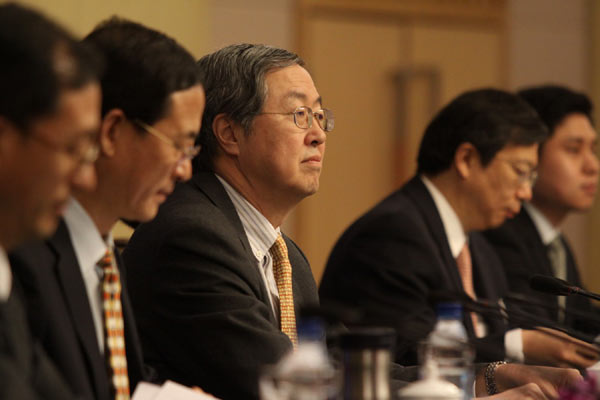PBOC: Market playing larger role in yuan rate
Updated: 2012-03-12 11:01
(Xinhua)
|
||||||||
Zhou Xiaochuan (3rd L), governor of the People's Bank of China (PBOC), the country's central bank, Hu Xiaolian, deputy governor of PBOC, Liu Shiyu, deputy governor of PBOC, and Yi Gang, deputy governor of PBOC and head of the State Administration of Foreign Exchange hold a news conference on monetary policies and financial reforms in Beijing on Monday. [Photo by Jiang Dong/chinadaily.com.cn]

BEIJING - A trade deficit in the first two months this year and its impact on the exchange rate of Renminbi is "a good thing" for China, the governor of China's central bank said Monday.
The supply and demand relations in the market are playing an increasing role in deciding the exchange rate of the Chinese currency, Zhou Xiaochuan, governor of the People's Bank of China (PBOC), said at a press conference on the sidelines of the ongoingannual parliamentary session.
China swung to a trade deficit of $31.48 billion in February, the largest in a decade, as import growth far outpaced exports.
Yi Gang, vice governor of the PBOC and director of the State Administration of Foreign Exchange (SAFE), also described the trade deficit in February as a "positive sign" for a more balanced international balance of payment for China.
Diversification of FX holdings
China will continue to implement the principle of diversifying its investment in foreign bonds, saying its holdings of eurozone bonds did not register losses as a portfolio, said Yi.
Yi reiterated China's confidence in Europe despite the current debt crisis, saying China will continue to be a "long-term and responsible" investor in Europe.
In terms of the value of China's investment portfolio in eurozone bonds, Yi said revenues of China's eurozone portfolio still beat the inflation in Europe despite the ongoing debt crisis.
Yi stressed risk control will be the priority of China's foreign exchange investment, with the emphasis on safety, liquidity and potential revenues.
Monetary policy
Zhou Xiaochuan, the PBOC governor, said the cuts in banks' reserve requirement ratio (RRR) were not to boost capital market confidence or improve property market liquidity.
Funds released from RRR cuts will flow to different sectors of the national economy in accordance with loan distributions. "There will not be a typical direction," said Zhou Xiaochuan, governor of the People's Bank of China (PBOC).
RRR adjustments do not necessarily reflect monetary policy conditions, but, instead, are adopted to hedge against changes in the country's foreign reserves, Zhou said at a press conference on the sidelines of the country's annual parliamentary session.
The central bank has cut the RRR twice in three months to 20.5 percent for large commercial banks and 17 percent for mid- and small-sized banks, after hiking the RRR six times last year in an effort to check inflation.
The latest cut in February lowered the RRR by 50 basis points and released an estimated 400 billion yuan ($63.54 billion) in capital into the market.
"Theoretically speaking, there is much room for RRR cuts," Zhou said, but he noted that the adjustment of the RRR will depend on market liquidity conditions, which are connected to China's yuan funds outstanding for foreign exchange and the balance of international payments.
China's central bank has also used quite a few monetary policy price tools, according to Zhou. The PBOC has hiked interest rates five times since October 2010.
"But there are restraints, and we are paying particular attention to the possible impact on capital flows, especially in a time of economic globalization," he said.

 Relief reaches isolated village
Relief reaches isolated village
 Rainfall poses new threats to quake-hit region
Rainfall poses new threats to quake-hit region
 Funerals begin for Boston bombing victims
Funerals begin for Boston bombing victims
 Quake takeaway from China's Air Force
Quake takeaway from China's Air Force
 Obama celebrates young inventors at science fair
Obama celebrates young inventors at science fair
 Earth Day marked around the world
Earth Day marked around the world
 Volunteer team helping students find sense of normalcy
Volunteer team helping students find sense of normalcy
 Ethnic groups quick to join rescue efforts
Ethnic groups quick to join rescue efforts
Most Viewed
Editor's Picks

|

|

|

|

|

|
Today's Top News
Health new priority for quake zone
Xi meets US top military officer
Japan's boats driven out of Diaoyu
China mulls online shopping legislation
Bird flu death toll rises to 22
Putin appoints new ambassador to China
Japanese ships blocked from Diaoyu Islands
Inspired by Guan, more Chinese pick up golf
US Weekly

|

|






